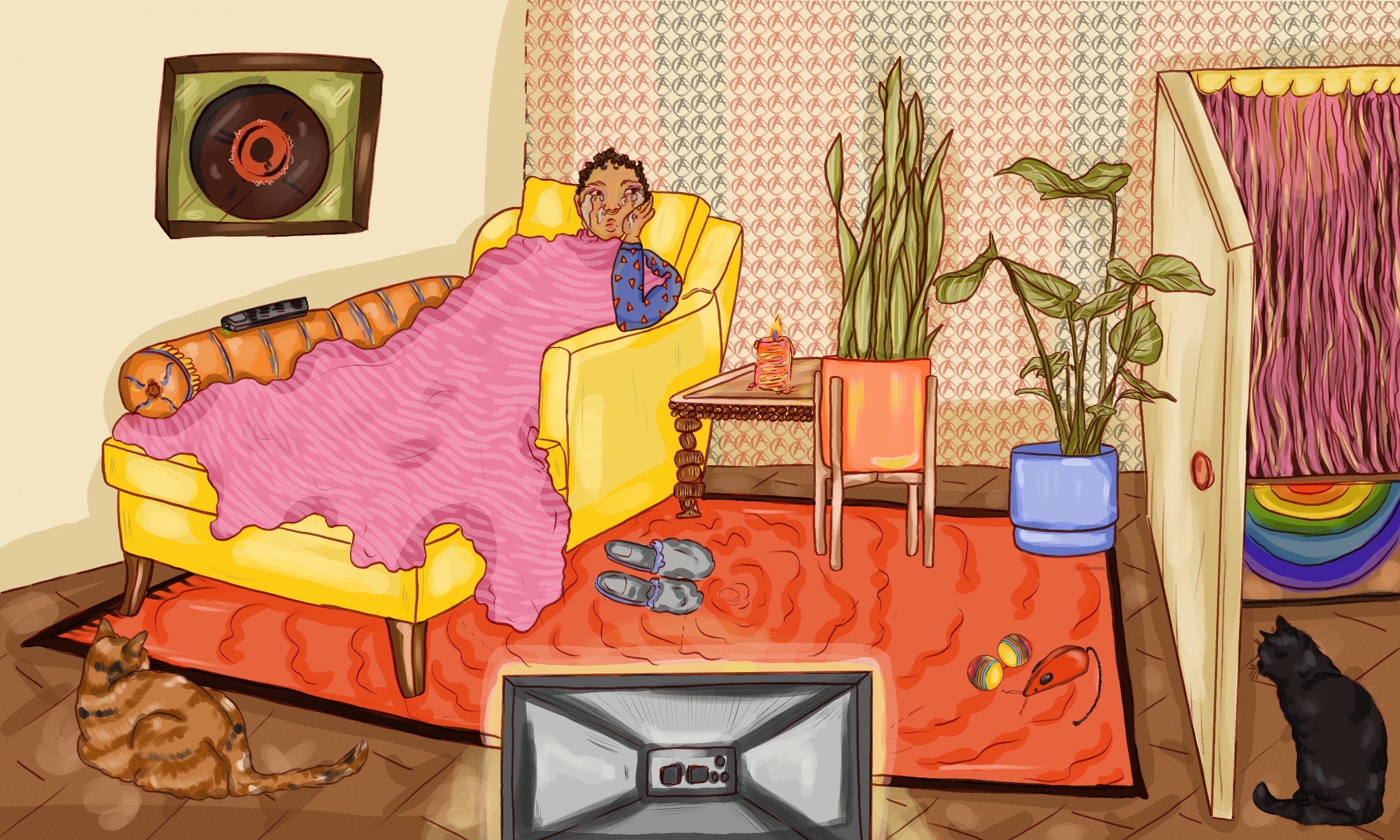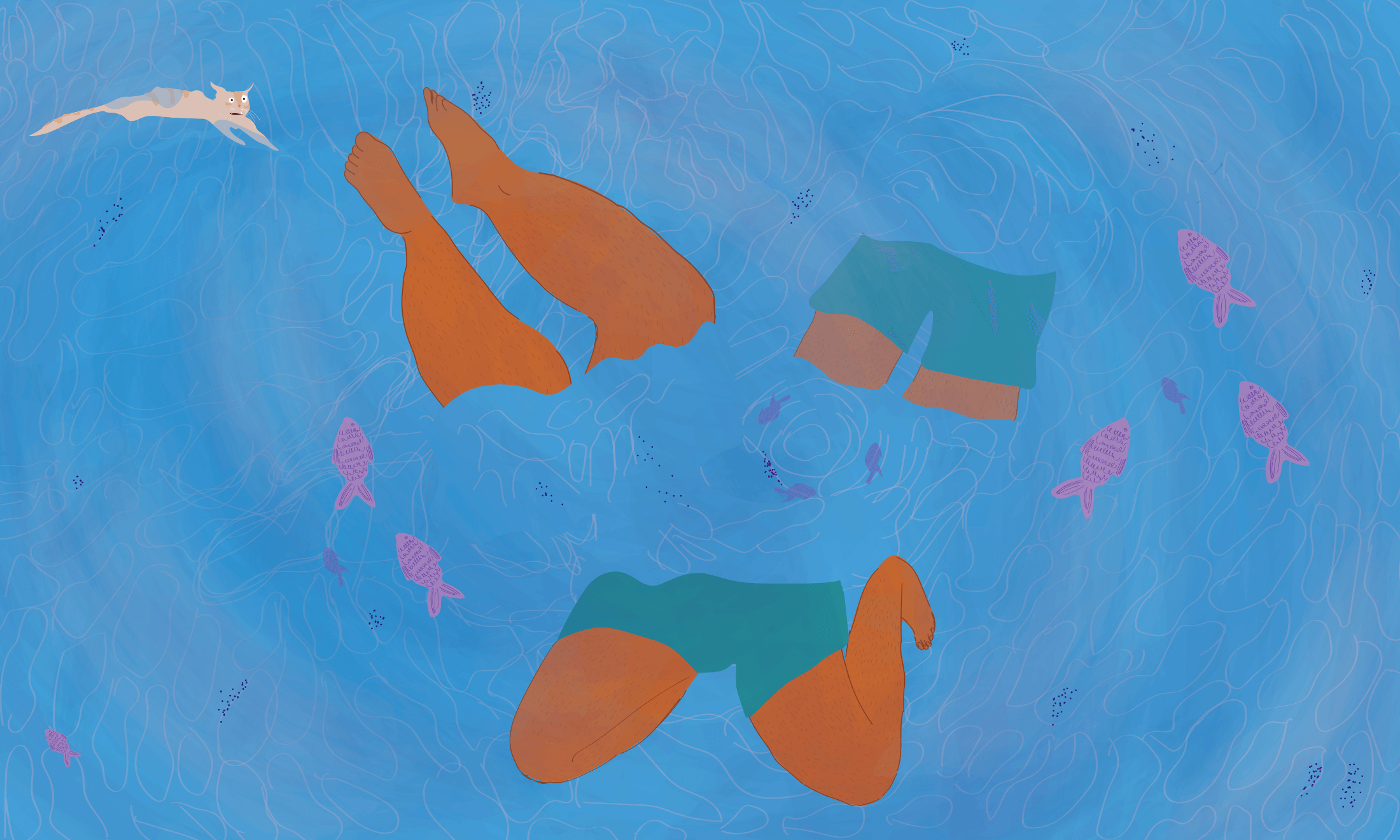
Parishma Patani
The pain and joy of rediscovering my trans tears
How allowing myself to shed tears helped me break down the armour of my past.
Dawood Qureshi and Editors
18 Feb 2022
I settle into a comfy chair, draw the blanket up to my chin, leaving a gap to reach out and press play on the laptop balanced comfortably on my lap. This Is Us, a beautiful show I’ve become a little obsessed with, plays from where I left off. A father and son show up onscreen. The two are drawn into an embrace, laughing and sobbing simultaneously.
I remember thinking, I don’t think I’ve ever seen my father – my Ubby – cry.
It starts at the corners of my eyes – a strange, tingling sensation. Then, under my eyelids. It burns now, and suddenly I’m sniffing furiously. I can’t quite understand it, but I know the feeling well. I’m crying. Each spool of liquid is pulled out in sobs, and I reach up to push them away, smudging my makeup in the process.
Except this isn’t happening like it does onscreen. These are forced, tired tears; they stop at the door, demanding permission that I cannot give, as I do not know how…soon there are too many, and they push their way through. This isn’t movie magic, it’s not sweet or choreographed. It’s painful. It’s walled in with quick glances around me; the slightest hint of another person will reel the tears back in.
“These are forced, tired tears; they stop at the door, demanding permission that I cannot give”
To see me now, you would probably think I was quite emotionally self-aware. I wear myself on my sleeve – colourful, queer-coded clothes, a lover of wildlife and punk, I write about fashion and dance, and thoughts on self-love and body-shaming litter my Twitter feed. I should know all about the need for venting, and the complicated world of trauma.
I’m told I cried a lot when I was young, but there’s a large chunk of my life, between the soft child I started as, and the closed-off adult I am now, that influenced these burning tears I cannot shed.
My Ubby, the self-proclaimed ‘head’ of the household, strongly believed in boys growing up to be leaders, and the need for a tough exterior and an emotional armour to cope with the outside world. I don’t think this comes from a terrible place; most South Asian Muslim men I know, due to the overbearing regulations that set a precedent of clearly labelled gender-based roles, are cut into ‘masculine’ figures whose job it is to protect, with often little understanding as to why, or even how. As part of this male armour, you are taught never to cry.
“As I explore my identity as a trans Muslim, I am plagued by the harsh words from the men of my past”
As the eldest sibling, and the eldest brother – as I identified back then – I felt I was the leader and protector of my younger siblings. This role was bittersweet; the love I had for them was poisoned by the need to never break stride, never break down, and forever paint over the cracks.
All these years later, as I explore my identity as a trans Muslim, I am plagued by the harsh words from the men of my past. The identification of crying as a ‘feminine’ trait, and the links this has to being vulnerable, are particularly damning. If I cannot cry, and I struggle to show my deepest emotions, and if I am only able to rip this sadness from within myself when I am alone…does this make me less…feminine? Am I so infected by the male toxicity of my youth that I can never hope to be feminine in the way I choose? Will I ever learn to dance freely through my emotions as I see women on TV and in books do? As I see my white, cisgender friends do? This is as much a race issue as it is a gender issue; people of colour often grow up with a premature set of responsibilities thrust upon them, and this can create a barrier between them and the freedom at which they express themselves.
“Crying feels like the ultimate release, and the rediscovery of my tears has been a long and tedious journey that has by no means been fully realised”
Even if I now understand that femininity and masculinity are not bound by our ability to produce tears; and that our gender and identity are ours alone, and so much more than the emotions we can and can’t access, I still struggle. I am seeking femininity through the freedom of feeling, and perhaps that is where I am falling.
Yet there is a privilege in being able to shed tears. When you grow up with this allowance of vulnerability, it gives you a step up over those of us who are still struggling with unravelling these emotions, especially when we are also battling dysphoria around our gender and sexuality. Tears are a gift I feel I’m forever watching others granted, one that I hope I am allowed one day too, because in the times when I do cry, the feelings of my past can finally fall, running down my face and leaving my body.
For me, crying feels like the ultimate release, and the rediscovery of my tears has been a long and tedious journey that has by no means been fully realised. I would hope that perhaps my Ubby rediscovers his tears in the same way, and that the many Muslim, South Asian patriarchs ‘protecting’ those around them from their emotions break this cycle of hurt that is passed to their kids. The world doesn’t need protection from their tears. It needs their laughs, their hugs, their love, and most importantly, their strength to show those very same tears, openly, and without shame.








